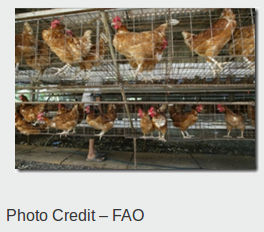#11,441
At I mentioned yesterday, Egypt's poultry industry has seen even greater losses than usual of late, prompting the state Veterinary Service to begin testing to see if another HPAI virus (H5N8) might have taken up residence in Egypt.
While H5N8 is one possibility, the other is that the HPAI H5N1 virus circulating in Egypt has evolved (again), and is either more virulent or simply evading the vaccines currently in use.
Like China, Indonesia, and Vietnam, Egypt relies heavily on poultry vaccines to control their H5N1 problem.
And while poultry vaccines can be credited with reducing poultry losses, promoting better food security, and likely reducing human infections as well, they can have some pretty major downsides as well.
In EID Journal: Subclinical HPAI In Vaccinated Poultry – China, we looked at H5N1 infections that poultry vaccines only masked, making birds appear to be healthy while allowing HPAI to continue to circulate, and new variants or reassortants continue to emerge.
This is a topic we revisited again in 2015 in Study: Recombinant H5N2 Avian Influenza Virus Strains In Vaccinated Chickens.
More recently, last March in Virology Journal: Evolution of H5N1 Clade 2.2.1 In Egypt we looked at a study which found H5N1 in Egypt is acquiring (in their words `alarming') changes, and suggests that `the rapid evolution of H5N1 viruses in Egypt was possibly linked to vaccination pressure due to sub-optimal use of vaccines.'
According to Arabic media reports this morning, the first test results looking for H5N8 have been negative, instead showing the long established HPAI H5N1 virus. Whether it has changed in any substantial way will require further investigation.
Meanwhile more tests for H5N8 are underway, as Egypt seeks to solve the mystery of suddenly increased poultry mortality.
Initial samples of poultry free from "American influenza"
Thursday 09-06-2016 | 0:30
Said Dr. Ibrahim Mahrous, head of the services of veterinary: The body tasked Directorates of Veterinary Medicine governorates yesterday, to form a band 27 to collect samples of poultry suspected of being infected with bird flu h5n8 American farms in all the provinces , to be tested and confirmed to be infected or not.
He explained , "guarded" for " gate " to collect samples Seetmr for 3 days to find out the type of the disease , which caused a high mortality of poultry rate of 100% in the past few days, pointing out that the analysis of 25 samples at the Research Institute for Animal Health , Ministry of Agriculture, has not been seen by the American virus, but ordinary flu avian virus rampant in the back of Egypt,
While the arrival of H5N8 would be a major blow to Egypt's poultry industry, and could give the fledgling virus a genetic playground in which to experiment and grow, a new (more virulent) H5N1 virus wouldn't be good news either.
Either way, we'll be keeping a watchful eye on Egypt in the coming months.
